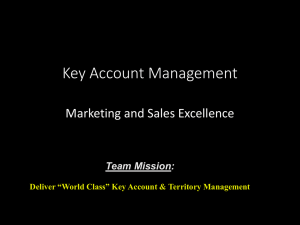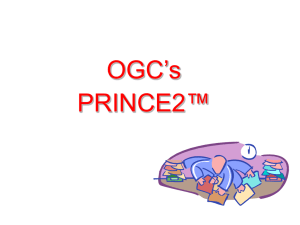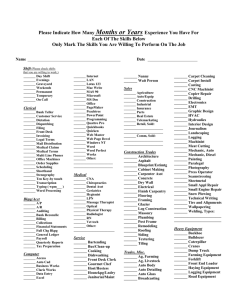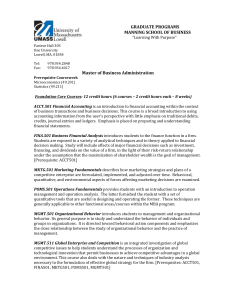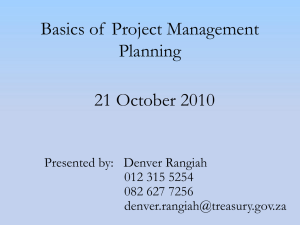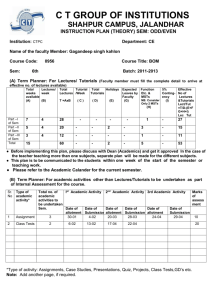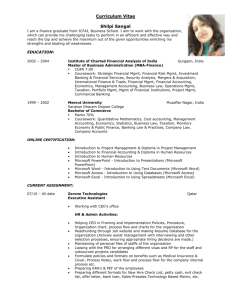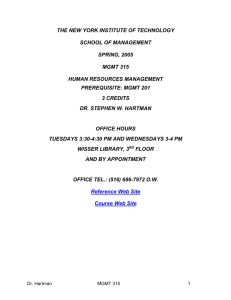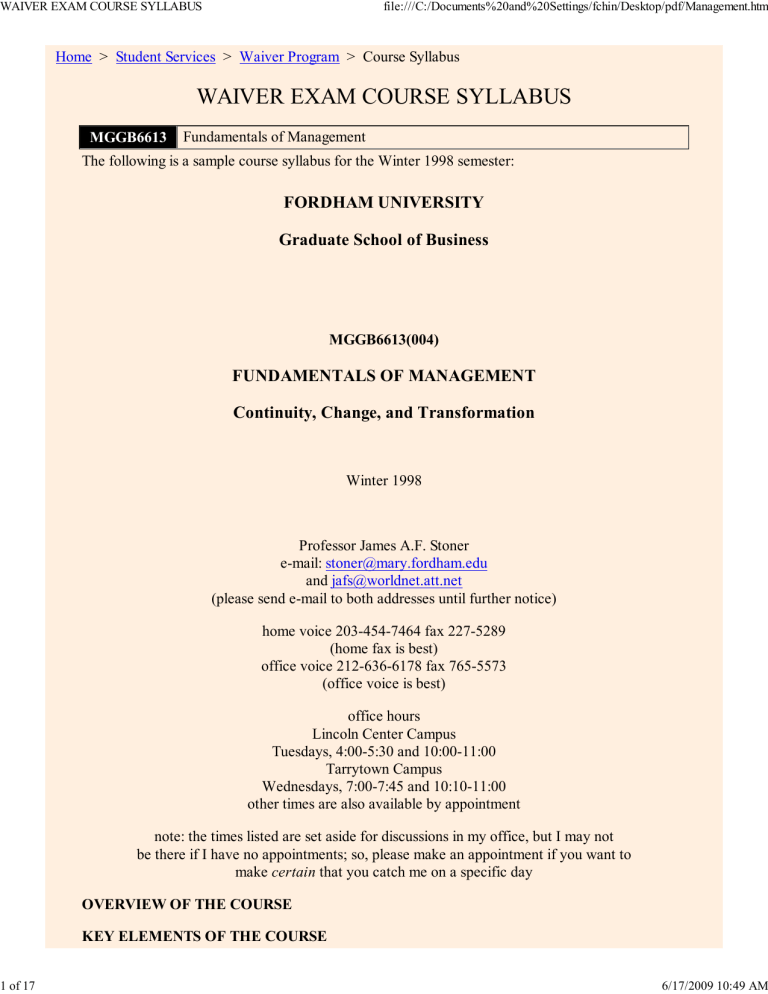
WAIVER EXAM COURSE SYLLABUS
1 of 17
file:///C:/Documents%20and%20Settings/fchin/Desktop/pdf/Management.htm
Home > Student Services > Waiver Program > Course Syllabus
WAIVER EXAM COURSE SYLLABUS
MGGB6613
Fundamentals of Management
The following is a sample course syllabus for the Winter 1998 semester:
FORDHAM UNIVERSITY
Graduate School of Business
MGGB6613(004)
FUNDAMENTALS OF MANAGEMENT
Continuity, Change, and Transformation
Winter 1998
Professor James A.F. Stoner
e-mail: stoner@mary.fordham.edu
and jafs@worldnet.att.net
(please send e-mail to both addresses until further notice)
home voice 203-454-7464 fax 227-5289
(home fax is best)
office voice 212-636-6178 fax 765-5573
(office voice is best)
office hours
Lincoln Center Campus
Tuesdays, 4:00-5:30 and 10:00-11:00
Tarrytown Campus
Wednesdays, 7:00-7:45 and 10:10-11:00
other times are also available by appointment
note: the times listed are set aside for discussions in my office, but I may not
be there if I have no appointments; so, please make an appointment if you want to
make certain that you catch me on a specific day
OVERVIEW OF THE COURSE
KEY ELEMENTS OF THE COURSE
6/17/2009 10:49 AM
WAIVER EXAM COURSE SYLLABUS
2 of 17
file:///C:/Documents%20and%20Settings/fchin/Desktop/pdf/Management.htm
Goals: Ideally, this course will eventually be a required first term course for all Fordham MBA
candidates. This term most class members will not be first-termers, but we will seek a set of goals
especially appropriate for a first-term-at-Fordham course. Those goals are:
1.
2.
3.
4.
5.
6.
have fun
work hard (and efficiently)
learn a lot
earn high grades
have a successful (enjoyable and productive) experience working in a team
integrate the course with your life and work experiences (past and present)
Key elements: The course has seven key elements:
1. the content goal of achieving a reasonable level of managerial and organizational literacy,
2. the presentation of a vision of the emerging new management paradigm (which might bear
such names as A world class managing or A dynamic tqm - dynamic total quality
management),
3. the explicit recognition that most or all of us currently work in and with organizations that
are managed in ways far short of that vision (we can call the ways our organizations are
currently managed A Partial quality management ),
4. the intention of encouraging class members to integrate the course material as much as
feasible with their current work, family, and life situations and to support class members in
making progress in improving their performance and satisfaction in all three areas,
5. a structure of the course that emphasizes team-based shared learning,
6. three An Ideal purposes related to your career, life, and contribution to your employing
organization (if you are currently working), and
7. a meta-theme of an emerging global quality management technology.
Managerial and Organizational Literacy: The primary resource for pursuing managerial and
organizational literacy is a well-established management textbook (Stoner, Freeman, and Gilbert,
Management, 6th edition, Englewood Cliffs: Prentice Hall, 1995) called Mgmt hereafter. The prof's
goal for the class members is for them to achieve a pretty solid understanding and recall of the
content of all but a few chapters in the book.
Vision of the New Paradigm: The primary resource for gaining a vision of the emerging new
management paradigm is a monograph seeking to describe the newly emerging global management
paradigm (Stoner and Wankel, World Class Managing: Two Pages at a Time - Book I, New York:
Fordham GBA, 1990) Called WCM2P hereafter. The prof's goal for the class members is for them to
achieve a pretty solid understanding and recall of the content of the monograph. If class members
do so, they will have at least one vision of the newly emerging paradigm and can use it in the
on-going process of creating and re-creating their own vision of what managing and organizational
life can and should be.
Partial Quality Management: Because most or all of us currently work in and with organizations
that are managed in ways far short of A World class status, we will keep an on-going focus on how
we can contribute effectively to organizations that frequently make it very hard for us to do our
best. We will also be very alert to how organizations we work in and with are evolving toward world
class status (or regressing away from it). In the course we will use the term A Partial quality
management to emphasize that most organizations have made at least some progress toward world
class managing or dynamic tqm, but none have really fully reached that state.
6/17/2009 10:49 AM
WAIVER EXAM COURSE SYLLABUS
3 of 17
file:///C:/Documents%20and%20Settings/fchin/Desktop/pdf/Management.htm
Integrating Work, A Family/Community, and Learning: Four elements of the course offer
opportunities to integrate work, family/community, and learning: a one page assignment reporting
your progress on your course goals, a one page assignment reporting your progress in handling your
most pressing problem (or opportunity) at work, a one page assignment reporting your progress in
handling your most pressing problem (or opportunity) in relationship to family/community, and a
team-based term project. For the purpose of this assignment, the words Family/community are
intended to cover all major social relationships: immediate family, very close friends, colleagues at
work or in voluntary organizations in which you participate, etc. In a similar manner, learning
includes formal study in your Fordham MBA program or any other type of formal or informal
learning associated with work and career.
The three short essays provide a vehicle for you to make progress on integrating work,
family/community, and learning. The term project provides an opportunity to develop and present
an original (and appropriately disguised) case based on one of the team members' current
work/career situation. In addition to its relationship to work issues, the case also offers an
opportunity to address an issue, situation, or problem relating to family/community or learning or
both. (Of course, your team may develop a term project that is not a case, as noted below.)
Team-based Learning: One of the characteristics of world class managing is the appropriate and
effective use of teams. Even in the organizations that have made the most progress in moving
toward world class managing, not all work is accomplished in teams and not all structures and
reward systems are built around teams. However, the increased frequency of team use and the
learning of ways to use teams very effectively are two of the major trends in the 1990s. The
importance of teams is likely to continue, and the course will emphasize improving our skills and
enjoyment in team work.
Ideal Purposes: Ideally, the professor would like the course to enable you (1) to increase your
contributions to organizations with which you work at present and in the future, (2) to increase your
enjoyment of your work, and (3) to increase your ability to integrate your working, living, and
learning into a fulfilling whole.
To achieve these ends, the course will (1) seek to increase your understanding of the changes
occurring to the process of managing around the world, (2) support your efforts to increase your
ability to contribute to your organization, (3) provide a forum for your experiments in integrating
work, life (outside of work and study), and learning.
Meta-Theme: A meta-theme of the course is that the changes occurring in management practices
around the world offer the possibility that a global quality management paradigm is emerging C a
way of managing that differs somewhat from country to country, industry to industry, company to
company, and organizational function to organizational function, but which has a great many
fundamental similarities across all of these dimensions. This meta-theme suggests that understanding
how this paradigm is emerging and mastering its philosophy and techniques will contribute in a
major way to your ability to manage effectively in any country or culture throughout the world.
COURSE PROCEDURES
Managerial and Organizational Literacy: We shall assume that class members can read graduate
and advanced undergraduate level text material (such as Mgmt and WCM2P) on their own with
reasonable comprehension. Therefore, the first two items will not be discussed very much in class.
Progress in achieving managerial and organizational literacy will be assessed on a mid-term and a
final examination.
6/17/2009 10:49 AM
WAIVER EXAM COURSE SYLLABUS
4 of 17
file:///C:/Documents%20and%20Settings/fchin/Desktop/pdf/Management.htm
Some of the chapters in Mgmt and in WCM2P will be directly relevant to a class or case discussion
on a particular day. Others will not match any particular case or class session, but are still needed
for managerial and organizational literacy. Chapters relevant to a particular session will be assigned
for that session. Chapters not fitting a particular session will be assigned at various times in the
course to balance the reading load.
Managerial and Organizational Action: The primary focus of our class time will be formal and
informal experimentation, inquiry, and sharing related to contribution and learning in organizations.
Many of our classes will involve discussing cases which are intended to stimulate your thinking
about how you can increase your contribution to present and future organizations. The term project
is also intended to address the question of contributing more effectively to an organization.
SPECIAL SCHEDULING SITUATIONS
This course is being taught at both the Lincoln Center and Tarrytown campuses. If you would like to
attend a Tarrytown session (on Wednesdays at 8:10-10:10) to ease any scheduling problems you
may have, please check with me to make arrangements (and to check the Tarrytown schedule,
which varies a bit from ours).
We have one special scheduling situation this term that we need to be aware of and to plan around.
11. We need to schedule an extra class session late in the term so that each team has sufficient time
to present its term project. (The term project presentation is a major part of the course work and
experience has shown (1) that a solid 55 minutes is needed for teams to do their best (and to earn
the highest grades) on these presentations and (2) for the class-member audience to have the most
enjoyable and best learning experience from them.
We will discuss this schedule situation in class and we will see if we can improve on the schedule
adjustment that I have suggested in the syllabus. The adjustment I have suggested is:
1. An extra class session at 8:00 -10:00 pm on Thursday, April 16 for two teams to make their
presentations to as many of the class members as can attend.
DELIVERABLES
Term Project:
The class will be divided into teams. (The ideal team size is about five to seven members). Each
team will be responsible for leading a class discussion for about one hour during the final class
sessions in week 14 and 15. Most teams will develop an own case based upon a current or past
work situation of one of the team members' and will lead that case discussion in class. (Although
most teams choose to develop and lead a case, other approaches are possible and acceptable to the
prof). Experience shows that an excellent presentation and discussion can be conducted in 60
minutes. If things go well, we will have an example of an excellent term project presentation in
session #5.
In developing ideas for the term project, it would be valuable for team members to keep in mind the
course's emphasis on the emergence of a global quality management technology. Right now, one of
the major ways we are experiencing the emergence of that management technology is in the
transition of global management from a traditional command-and-control management paradigm to
a quality-based world class managing paradigm. Each team will be asked to make an explicit
6/17/2009 10:49 AM
WAIVER EXAM COURSE SYLLABUS
5 of 17
file:///C:/Documents%20and%20Settings/fchin/Desktop/pdf/Management.htm
statement before, during, or after its presentation about how their presentation relates, or does not
relate, to that broad theme of transition from traditional management systems to world class
management systems. To the extent that term projects can capture this theme, they will add to the
sophistication and value of the course.
Documentation for the term project. Your true deliverable for the term project is what happens in
class when your team makes its presentation. Your session should be valuable and fun for all
concerned. Your team is also requested to hand-in, during the last class, any materials that were
used in preparing and making the presentation. Handing in this documentation should require no
appreciable extra work. It should be just an assembling of items your team accumulated during the
term as it developed its presentation. One good way to look at this item is to assume that another
team is going to do a presentation just like yours and will try to improve it. So you might say: If
another team were to do what we did, using our work as its starting point, what would be helpful for
them to have from the items we developed.
Essay on What Worked and Did Not Work in the Team:
Each team will be responsible for writing one essay in which the team members discuss: How the
team worked together during the term,
How the team evolved over the term, and
What worked and did not work in working together as a team.
This essay should be four to six typewritten pages and is due at the beginning of session 15.
(Instructions are in the course notebook (see session 15.)
Essays on course goals, work-related problem/opportunity, and family/community
problem/opportunity, and acknowledgement letter:
In session 9, the prof will collect very short progress indicators and reminders on these
assignments. The item collected in session 9 will a single sheet of paper containing very short
outlines of the one page essays you will write toward the end of the term and a list of three possible
candidates for your acknowledgment letter. (All four of these items should be squeezable unto just
one page for this session 9 deliverable).
During week 14, the prof will collect three one page essays: one describing the actions you took and
the progress you made in achieving your own goals for the course, one describing a work-related
problem or opportunity you worked on during the term and your progress on handling it, and one
describing a family or community-related problem or opportunity you worked on during the term
and your progress on handling it. Instructions for these essays appear in the course notebook section
for session 14.
During week 14, the prof will also collect a copy of an acknowledgment letter you wrote and sent
or delivered to someone who contributed to your learning in and enjoyment of the course. You
may write this acknowledgement to anyone except the prof. The copy you hand in to the prof
should have written on it the exact date you mailed or delivered the letter to the addressee. The
acknowledgment will be graded in the sense that if it is in on time and is reasonably well written, it
will count as an AA on this part of the course. Good acknowledgement letters tell people (1) what
they did that you appreciated, (2) how what they did was helpful to you, and (3) how you feel about
their contribution. Finally, it will (4) thank them for their contribution. As is noted below, the essays
and the acknowledgment letter will be graded in the sense that if they are on time and are
6/17/2009 10:49 AM
WAIVER EXAM COURSE SYLLABUS
6 of 17
file:///C:/Documents%20and%20Settings/fchin/Desktop/pdf/Management.htm
reasonably well written, they will count as an AA on this part of the course.
NOTES ON CASE PREPARATION:
There will be a number of cases to be prepared before class. For each case, there will be a single
page of questions to be addressed in preparing the case. These questions will be attached to the
case. Each class member is responsible for
1. reading the case very carefully before class,
2. being prepared to describe the basic situation of the case to start the class (to state the 'facts of
the case' at the beginning of the class),
3. answering the questions on the case assignment page (to make things easy and simple, the
answers should be written on the front and back (if necessary (of the assignment page),
4. making a photocopy of that page before class if the answers are not so firmly etched in one's
mind that handing in the answers would cause discomfort during the ensuing case discussion, and
5. handing in that page at the beginning of class if requested by the prof.
It is possible that these case preparation notes may never be collected. It is also possible that they
may be collected more than once during the term.
Very important point: When a case is assigned for class, the prof will assume unless he hears
otherwise from you before the start of class that you are fully prepared to discuss the case.
Therefore, if events interfere with your preparation for class, please inform the prof before the
start of class. (A very short note, such as: AI am not fully prepared. name , would do the job) If
informed that you are not fully prepared, the prof will endeavor not to call upon you unless your
hand is raised. Your being unprepared will probably not delight the prof, but he will understand an
occasional work or family emergency. However, if you are unprepared and that fact emerges during
the class discussion rather than before class, the prof will be much less understanding.
GRADING
Grades will be based on four items with the following percentages assigned to each:
Mini-mid-term exam
15%
Final exam
30%
Term project
30%
Team essay on how the team worked together
5%
Class contributions, acknowledgement letter, one page essays on
progress in achieving course goals, dealing with a work-related
problem/opportunity, and dealing with a family/community-related
problem.
20%
Mid-Term and Final Exams
A mid-term exam is scheduled for session 6 and the final exam is scheduled for session 15. Both
6/17/2009 10:49 AM
WAIVER EXAM COURSE SYLLABUS
7 of 17
file:///C:/Documents%20and%20Settings/fchin/Desktop/pdf/Management.htm
exams will cover all reading material and all class events up to the exam session. The exam will also
contain questions on class discussions, including case discussions.
The final will be more heavily weighted on material covered after the mid-term, but it will contain
some questions on material assigned before the mid-term. (Because the final covers the entire
course, it enables the prof to make an occasional special exception for class members who blow the
mid-term but Ace the final. In such cases, the prof may consider it appropriate to alter the specified
grade weightings and forgive a low mid-term grade).
The purpose of the exams is to give class members an opportunity to demonstrate that they have
obtained a solid understanding of the reading and of the class discussions such as important points in
a case discussion. In most instances, the questions will not be seeking creativity nor requiring that
one go very far beyond the reading or class discussion. The tone is: just demonstrate that you recall
and understand what you read or what we talked about in class. The questions will be multiple
choice, true/false, and/or short essay. PLEASE SEE THE SAMPLE MID-TERM EXAM IN
THE COURSE 3-RING BINDER.
Class contributions (participation), course goals, work-related and family/community-related
problem/opportunity, and acknowledgements: Class contributions will be assessed by the prof to
the best of his ability, based upon individuals' contributions to class discussions and other actions
that support the classroom experience being a good one for all class members. Being in class is
clearly a part of contributing to the class as is being well-prepared for class sessions. Your presence
in class for the team presentations (especially the presentations of the other teams) at the end
of the term, is particularly important to the prof.
The essays on course goals, work-related problem/opportunity, family/community
problem/opportunity, and the acknowledgement letter will receive grades of AA providing they are
neatly done and handed in on time. Whether or not you reached your course goals or whether or not
you made good progress on your work and family/community related problems/opportunities will
not influence the grade you receive on these assignments as long as you report your efforts carefully
and appropriately. To reassure you that what you say in these three essays about the level of
progress you achieve will not influence your grade, the prof will (1) promise not to let what you say
enter into your course grade and (2) will try very hard to resist the temptation even to read these
essays until after the course is over and grades have been submitted. However, I may well glance
over them briefly to ascertain whether or not they are carefully and thoughtfully prepared.
SPECIAL ARRANGEMENTS FOR INTEGRATING AND BALANCING WORK, STUDY,
AND FAMILY
In this course, the prof will be attempting to learn how to support class members more effectively in
integrating and balancing their work and study with the rest of their lives. The prof recognizes that
the class members have a life outside the classroom (although that may not always be apparent in
his actions) and will try a number of things to assist class members to handle disruptive events that
can be foreseen in advance and unanticipated emergencies that occur during the term.
The support arrangements, so far, include the following:
1. Anticipateable conflicts with class attendance: A form, which is included in the course notebook,
requests each class member to report any class sessions (including the special Saturday session)
which the member knows now will have to be missed. That sheet will be collected in class session
number 2. The prof and class member will work out arrangements to handle the fact that the class
must be missed.
6/17/2009 10:49 AM
WAIVER EXAM COURSE SYLLABUS
8 of 17
file:///C:/Documents%20and%20Settings/fchin/Desktop/pdf/Management.htm
2. Team support: We will form teams early in the term. In addition to working together on the term
project, each team member will be encouraged to support the other team members in doing well in
the course, and in being well informed on events in any classes that have to be missed.
3. Individual acknowledgements: As part of the course, you are requested to write an
acknowledgement note to at least one person who contributed to your learning in and enjoyment of
the course. You may write the note to anyone in the class or not except the prof. You are to mail or
deliver that note before session 14 and give a photocopy to the prof in session 14.
4. Individual assignments focused on integration: The three assignments on defining and achieving
your personal goals for the course and for identifying and moving forward on a work-related
problem (or opportunity) and a family/community-related problem (or opportunity) are intended to
give you a chance to earn course credit (they will be graded) for your efforts to integrate the course
with other aspects of your life.
DETAILED COURSE SCHEDULE
1. Tuesday, Jan. 6
MANAGEMENT IN TRANSITION
The intention of this session is to explore an organizational change situation (a case to be distributed
in class), to start to get to know each other, to form working teams for the term, to tackle a subtle
task as a whole class, to remind ourselves how to scan/skim a book effectively, and to get a brief
overview of the course.
2. Tuesday, Jan 13
MANAGEMENT IN TRANSITION - Continued
The intention of this session is to continue getting to know each other, to complete our exploration
of one organizational change situation, and to share our visions of outstanding organizations (the
Brenda Marlo caselet).
Assignment for this session:
(1) Before doing anything else read the very brief Brenda Marlo caselet and make a list of the six
most important aspects, in your view, of an outstanding (world class) organizations. You do not
need to discuss your list with anyone else,
(2) Follow the instructions for scanning a book suggested in class in scanning all of Mgmt, and all of
WCM2P.
Reading:
(3) Chapters 1-7, WCM2P,
(4) Chapter 1, Mgmt, Managing and Managers.
6/17/2009 10:49 AM
WAIVER EXAM COURSE SYLLABUS
9 of 17
file:///C:/Documents%20and%20Settings/fchin/Desktop/pdf/Management.htm
(5) start Chapter 2 Mgmt, Evolution of Management Theory
Deliverables:
(1) Complete the sheet entitled Individual Goals,
(2) Complete the sheet entitled Amos Pressing Work-Related Problem or Opportunity ,
(3) Complete the sheet entitled Amos Pressing Family/Community-Related Problem or Opportunity,
(4) Complete the sheet entitled Anticipateable Schedule Conflicts.
3. Tuesday, Jan 20
THE NEW MANAGEMENT PARADIGM
The intention of this session is to start gaining an understanding of the concept of paradigms and
paradigm change and of the nature of the global management technology transformation that is
occurring, and to learn the Continue, Start, Stop technique.
Assignment for this session:
1. Reading:
(1) complete reading of Chapter 2 Mgmt,
(2) Chapter 8, Mgmt, Quality,
(3) Chapters 8-14 WCM2P
4. Tuesday, Jan 27
THE NEW MANAGEMENT PARADIGM - continued
The intention of this session is to continue to gain an understanding of the nature of the global
management technology transformation that is occurring, paying particular attention to the work of
W. Edwards Deming and Joseph Juran.
(1) W. Edwards Deming, Improvement of Quality and Productivity through Action by Management
(2) Chapters 15-21 WCM2P,
(3) Chapter 3, Mgmt, Environment
xx Wednesday, Jan 28 - 12th floor Lounge (Lincoln Center) 6:00-8:00pm
Optional guest speaker: Rafael Aguayo - speaking on Dr. Deming's work
5. Tuesday, Feb 3
SELF-MANAGING TEAMS IN ACTION
The intention of this session is to start work on the team term project by experiencing an excellent
(benchmark) team project, to start working as a self-managing team, and to learn Nominal Group
6/17/2009 10:49 AM
WAIVER EXAM COURSE SYLLABUS
10 of 17
file:///C:/Documents%20and%20Settings/fchin/Desktop/pdf/Management.htm
Technique by using it to develop term project ideas.
Assignment for this session:
1. Reading:
(1) William J. Latzko The Nominal Group Technique (distributed),
(2) Chapters 22-28, WCM2P,
(3) Chapter 4, Mgmt, Ethics,
(4) Review the four assignments for class session #14 that relate to reporting your progress
achieving your individual course goals, making progress on your most pressing work-related
problem or opportunity, making progress on your most pressing family/community-related problem
or opportunity, and acknowledging another person.
xx Thursday, Feb. 5 - Residence Hall Lounge (Lincoln Center) 6:00-8:00pm
Optional guest speaker: Mary Walton - speaking on Dr. Deming's work
6. Tuesday, Feb. 10
TEAMWORK: EFFECTIVE DECISION-MAKING IN TEAMS, A CLASSIC SURVIVAL
EXERCISE
The intention of this session is to provide you an opportunity to look at your own contributions to
decision-making in a team and to begin inquiring into the nature of effective teams and the
leader/follower behaviors that create effective teams.
Assignment for this session:
1. Reading:
(1) Jay Hall article, Decisions, Decisions, Decisions
(2) Chapter 18, Mgmt, Teams and Teamwork,
(3) Chapter 7, Mgmt, Culture and Multiculturalism
(4) Chapters 29-30, WCM2P,
2. Review the assignment (due in class session #15) that relates to describing how your team worked
together this term. (See Instructions for Team Essay in the course notebook section for session 15).
7. Tuesday, Feb. 17
TEAMWORK: REVIEWING THE SURVIVAL EXERCISE AND OTHER TEAM EVENTS
The intention of this session is to debrief the survival exercise and other team events, to review the
progress of the course, and to continue working on term projects.
Assignment for this session:
6/17/2009 10:49 AM
WAIVER EXAM COURSE SYLLABUS
11 of 17
file:///C:/Documents%20and%20Settings/fchin/Desktop/pdf/Management.htm
1. Reading
(1) Chapter 5, Mgmt, Globalization,
(2) Chapter 6, Mgmt, Inventing and Re-inventing Organizations.
2. Review the assignment for class session #15 that relates to describing how your team worked
together this term.
8. Tuesday, Feb. 24
MID-TERM EXAMINATION
Assignment for this session:
1. Review readings and class notes for the mini-mid-term.
9. Tuesday, Mar. 3
LEADERSHIP
The intentions of this session are to explore questions of leadership in changing organizations and to
explore an important step in career evolution.
Assignment for this session:
1. Prepare the Bob Knowlton (B) case
2. Reading
(1) Chapter 16, Mgmt, Motivation,
(2) Chapter 17, Mgmt, Leadership
(3) Chapters 1-7, WCM2P
Deliverables - from each individual
1. Four bullet outline of one page essay on progress toward achieving your course goals.
2. Four bullet outline of one page essay on progress on dealing with the most important problem or
opportunity at work.
3. Four bullet outline of one page essay on progress on dealing with the most important
family/community problem or opportunity.
4. Name of three candidates for acknowledgement letter.
Please put all four items above (#1 to #4) on a single sheet of paper (this is not a long assignment).
Deliverables - one from each team
1. Four bullet outline of Team term project essay (one copy per team).
6/17/2009 10:49 AM
WAIVER EXAM COURSE SYLLABUS
12 of 17
file:///C:/Documents%20and%20Settings/fchin/Desktop/pdf/Management.htm
10. Tuesday, Mar. 10
MANAGING CAREERS IN CHANGING ORGANIZATIONS
The intention of this session is to explore issues related to managing your and other's careers in
changing organizations.
Assignment for this session:
1. Prepare The Resnick Company (B) case.
2. Reading:
(1) Chapter 13, Mgmt, Power,
(2) Chapter 14, Mgmt, Human Resource Management
(3) Chapters 8-14, WCM2P
Deliverable - one from each team member for each team member
1. Hand in one completed team member feedback form for each member of your team
xx. Tuesday, Mar. 17
SPRING BREAK - ENJOY
11. Tuesday, Mar. 24
MANAGEMENT BY FACT - USING DATA IN DECISION-MAKING
The intention of this session is to explore managerial decision-making under time pressure and the
usefulness of quantitative data in such decision-making.
Assignment for this session:
1. Prepare Carter Racing
2. Reading:
(1) Chapter 9, Mgmt, Decision-Making,
(2) Chapter 12, Mgmt, Organizational Design and Structure
(3) Chapters 15-21, WCM2P
12. Tuesday, Mar. 31
COACHING IN CHANGING ORGANIZATIONS
The intention of this session is to explore the role of coaching in a complex managerial situation.
6/17/2009 10:49 AM
WAIVER EXAM COURSE SYLLABUS
13 of 17
file:///C:/Documents%20and%20Settings/fchin/Desktop/pdf/Management.htm
Assignment for this session:
1. Prepare Petersen Electronics (B)
2. Reading:
(1) Chapter 10, Mgmt, Planning and Strategic Management,
(2) Chapter 11, Mgmt, Strategy Implementation
(3) Chapters 22-28, WCM2P
13. Tuesday, April 7
TEAM PRESENTATIONS
The intention of this session is for the project teams to provide a valuable and enjoyable (i.e., fun)
learning experience for the class members (and to have a valuable and enjoyable experience
themselves in doing so).
Assignment for this session:
1. Prepare for team presentations
2. Reading
(1) Chapter 15, Mgmt, Organizational Change and Development
(2) Chapters 29-30, WCM2P
14. Tuesday, April 14
TEAM PRESENTATIONS
Assignment for this session:
1. Prepare for team presentations
14A. Thursday, April 16 Specially scheduled class session 8:00-10:00 pm
Room to be Announced
TEAM PRESENTATIONS
Assignment for this session:
1. Prepare for team presentations
Deliverables
1. One page essay on progress toward achieving your course goals.
2. One page essay on progress on dealing with the most important problem or opportunity at work.
6/17/2009 10:49 AM
WAIVER EXAM COURSE SYLLABUS
14 of 17
file:///C:/Documents%20and%20Settings/fchin/Desktop/pdf/Management.htm
3. One page essay on progress on dealing with the most important problem or opportunity related to
your family/community.
4. Copy of acknowledgement letter.
5. Completed forms for Feedback and Evaluation for Team Presentations are due at the end of
class or mailed to me by noon tomorrow.
6. Project documentation due from all teams.
15. Tuesday, April 21
WRITTEN FINAL EXAMINATION
The intention of this session is to enable you to demonstrate your success in completing and
understanding the assigned readings and our discussions in class.
Assignment for this session:
1. Review readings and class notes for the final exam.
Deliverables
1. Team term project essay due (one essay per team).
2. Hand in one completed team member feedback form for each member of your team
One Page Syllabus Summary - Lincoln Center Campus
Session/Date
Topics
Assignment to be prepared before class
1. Jan
Management in Transition intro to
course - Hovey and Beard (1) - form
teams
no prep
Management in Transition Hovey and
Beard (2) - introductions of class
members - course overview (cont'd)
Reading: (1) Brenda Marlo (A), (2) scan Mgmt and
WCM2P, (3) Read ch. 1-7, WCM2P, (4) Ch. 1, Mgmt,
Managing and Managers, (5) start Ch. 2. Mgmt, Evolution of
Mgmt Theory
6
2. Jan
13
Deliverables: (1) course goals (2) work
problem/opportunity (3) family/community
problem/opportunity (4) schedule conflicts
The New Management Paradigm
discovering the new mgmt paradigm
Reading: (1) ch. 2, Mgmt, (finish), (2) ch. 8, Mgmt, Quality
(3) WCM2P, Ch. 8-14
Reading: (1) Deming article, (2) WCM2P ch. 15-21, (3) ch.
3, Mgmt, Environment,
27
The New Management Paradigm the
management philosophy of W. Edwards
Deming
xx Jan 28
Rafael Aguayo - Dr. Deming's work
Optional guest speaker - 12th floor Lounge (LC)
6:00-8:00pm
5. Feb
Self-Managing Teams in Action benchmarking the term project - NGT for term
project ideas - team work mgmt model
Reading: (1) Latzko article on Nominal Group Technique,
3. Jan
20
4. Jan
3
(2) WCM2P, ch. 22-28, (3) ch. 4, Mgmt, Ethics
6/17/2009 10:49 AM
WAIVER EXAM COURSE SYLLABUS
15 of 17
file:///C:/Documents%20and%20Settings/fchin/Desktop/pdf/Management.htm
xx Feb 5
Mary Walton - Dr. Deming's work
Optional guest speaker - Residence Hall Lounge (LC)
6-8pm
6. Feb
Teamwork - team survival exercise
Reading: (1) Hall article, (2) ch 18, Mgmt, Teams and
Teamwork, (3) ch. 7, Mgmt, Culture, (4) ch. 29-30, WCM2P
Teamwork debriefing survival exercise,
etc.
Reading: (1) Ch. 5, Mgmt, Globalization, (2) Ch 6, Mgmt,
Inventing and Re-inventing Organizations.
8. Feb 24
Mid-term Exam
Review readings and class notes for mid-term
9. Mar
Leadership - Bob Knowlton (B)
Reading: (1) ch 16, Mgmt, Motivation, (2) ch. 17, Mgmt,
Leadership, (3) WCM2P ch. 1-7
10
7. Feb
17
3
Prepare: Bob Knowlton (B) case
Deliverables: 4-bullet outlines (course goal, work, family/
community), acknowledgement letter candidates; team essay.
10. Mar
Managing Careers in Organizations Resnick (B)
Reading: (1) ch 13, Mgmt, Power, (2) ch. 14, Mgmt,
Human Resource Management, (3) WCM2P ch. 8-14
10
Prepare: Resnick Company (B)
Deliverable: Team member feedback forms
xx Mar 17
Spring Break - no class
Enjoy
11. Mar
Management by Fact - Using Data in
Decision-making - Carter Racing (A)
Reading: (1) Ch. 9, Mgmt, Decision-Making, (2) Ch. 12,
Mgmt, Org Design and Structure, (3) WCM2P ch. 15-21
24
Prepare: Carter Racing (A)
12. Mar
Coaching in Changing Organizations Petersen Electronics (B)
Reading: (1) Ch. 10, Mgmt, Strategic Planning, (2) Ch. 11,
Mgmt, Implementation, (3) WCM2P 22-28
31
Prepare: Petersen Electronics (B)
13. Apr 7
Team Presentations
14. Apr 14
Team Presentations
14A. Apr 16
Team Presentations
- Thurs
Special class session (or on some other
day chosen by the class members)
Reading: (1) Ch. 15, Mgmt, Org. Change and Development,
(2) WCM2P 29-30
Deliverables: Feedback forms for all presenting teams (in
class or mailed by Friday noon), three one page essays
(course goals, work, family/community), acknowledgement
letter, team project documentation from all teams
8:00-10:00pm
15. Apr
Final Exam
Prepare for final exam. Deliverables: Team essay, team
member feedback forms (for own team members)
21
Fundamentals of Management Winter 1998
One Page Syllabus Summary - Lincoln Center Campus
Session/Date
Topics
Assignment to be prepared before class
1. Jan
Management in Transition intro to
course - Hovey and Beard (1) - form
teams
no prep
6
6/17/2009 10:49 AM
WAIVER EXAM COURSE SYLLABUS
16 of 17
2. Jan
13
Management in Transition Hovey and
Beard (2) - introductions of class
members - course overview (cont'd)
file:///C:/Documents%20and%20Settings/fchin/Desktop/pdf/Management.htm
Reading: (1) Brenda Marlo (A), (2) scan Mgmt and
WCM2P, (3) Read ch. 1-7, WCM2P, (4) Ch. 1, Mgmt,
Managing and Managers, (5) start Ch. 2. Mgmt, Evolution of
Mgmt Theory
Deliverables: (1) course goals (2) work
problem/opportunity (3) family/community
problem/opportunity (4) schedule conflicts
3. Jan
The New Management Paradigm
discovering the new mgmt paradigm
Reading: (1) ch. 2, Mgmt, (finish), (2) ch. 8, Mgmt, Quality
(3) WCM2P, Ch. 8-14
The New Management Paradigm the
management philosophy of W. Edwards
Deming
Reading: (1) Deming article, (2) WCM2P ch. 15-21, (3) ch.
3, Mgmt, Environment,
Reading: (1) Latzko article on Nominal Group Technique,
3
Self-Managing Teams in Action benchmarking the term project - NGT for term
project ideas - team work mgmt model
6. Feb
Teamwork - team survival exercise
Reading: (1) Hall article, (2) ch 18, Mgmt, Teams and
Teamwork, (3) ch. 7, Mgmt, Culture, (4) ch. 29-30, WCM2P
Teamwork debriefing survival exercise,
etc.
Reading: (1) Ch. 5, Mgmt, Globalization, (2) Ch 6, Mgmt,
Inventing and Re-inventing Organizations.
8. Feb 24
Mid-term Exam
Review readings and class notes for mid-term
9. Mar
Leadership - Bob Knowlton (B)
Reading: (1) ch 16, Mgmt, Motivation, (2) ch. 17, Mgmt,
Leadership, (3) WCM2P ch. 1-7
20
4. Jan
27
5. Feb
(2) WCM2P, ch. 22-28, (3) ch. 4, Mgmt, Ethics
10
7. Feb
17
3
Prepare: Bob Knowlton (B) case
Deliverables: 4-bullet outlines (course goal, work, family/
community), acknowledgement letter candidates; team essay.
10. Mar
Managing Careers in Organizations Resnick (B)
Reading: (1) ch 13, Mgmt, Power, (2) ch. 14, Mgmt,
Human Resource Management, (3) WCM2P ch. 8-14
10
Prepare: Resnick Company (B)
Deliverable: Team member feedback forms
xx Mar 17
Spring Break - no class
Enjoy
11. Mar
Management by Fact - Using Data in
Decision-making - Carter Racing (A)
Reading: (1) Ch. 9, Mgmt, Decision-Making, (2) Ch. 12,
Mgmt, Org Design and Structure, (3) WCM2P ch. 15-21
24
Prepare: Carter Racing (A)
12. Mar
Coaching in Changing Organizations Petersen Electronics (B)
Reading: (1) Ch. 10, Mgmt, Strategic Planning, (2) Ch. 11,
Mgmt, Implementation, (3) WCM2P 22-28
31
Prepare: Petersen Electronics (B)
13. Apr 7
Team Presentations
14. Apr 14
Team Presentations
14A. Apr 16
Team Presentations
- Thurs
Special class session (or on some other
day chosen by the class members)
Reading: (1) Ch. 15, Mgmt, Org. Change and Development,
(2) WCM2P 29-30
Deliverables: Feedback forms for all presenting teams (in
class or mailed by Friday noon), three one page essays
(course goals, work, family/community), acknowledgement
letter, team project documentation from all teams
6/17/2009 10:49 AM
WAIVER EXAM COURSE SYLLABUS
17 of 17
file:///C:/Documents%20and%20Settings/fchin/Desktop/pdf/Management.htm
8:00-10:00pm
15. Apr
Final Exam
Prepare for final exam. Deliverables: Team essay, team
member feedback forms (for own team members)
21
If you have questions you can contact the Admissions Office at:
Phone: 212-636-6200
Fax: 212-636-7076
Email: gbaadmin@mary.fordham.edu
©1999 Fordham University. All rights reserved. Questions? Please email to students@bbs.bnet.fordham.edu
6/17/2009 10:49 AM

